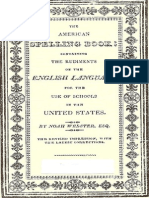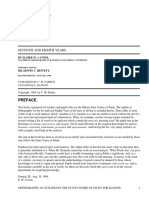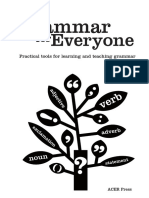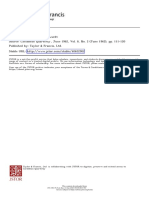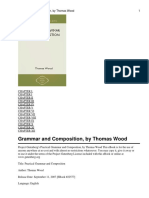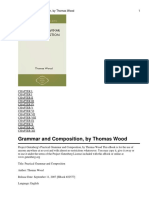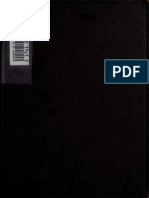The Revival of English Grammar Author(s) : Albert H. Tolman Source: The School Review, Feb., 1902, Vol. 10, No. 2 (Feb., 1902), Pp. 157-165 Published By: The University of Chicago Press
The Revival of English Grammar Author(s) : Albert H. Tolman Source: The School Review, Feb., 1902, Vol. 10, No. 2 (Feb., 1902), Pp. 157-165 Published By: The University of Chicago Press
Uploaded by
Sarla WorahCopyright:
Available Formats
The Revival of English Grammar Author(s) : Albert H. Tolman Source: The School Review, Feb., 1902, Vol. 10, No. 2 (Feb., 1902), Pp. 157-165 Published By: The University of Chicago Press
The Revival of English Grammar Author(s) : Albert H. Tolman Source: The School Review, Feb., 1902, Vol. 10, No. 2 (Feb., 1902), Pp. 157-165 Published By: The University of Chicago Press
Uploaded by
Sarla WorahOriginal Title
Copyright
Available Formats
Share this document
Did you find this document useful?
Is this content inappropriate?
Copyright:
Available Formats
The Revival of English Grammar Author(s) : Albert H. Tolman Source: The School Review, Feb., 1902, Vol. 10, No. 2 (Feb., 1902), Pp. 157-165 Published By: The University of Chicago Press
The Revival of English Grammar Author(s) : Albert H. Tolman Source: The School Review, Feb., 1902, Vol. 10, No. 2 (Feb., 1902), Pp. 157-165 Published By: The University of Chicago Press
Uploaded by
Sarla WorahCopyright:
Available Formats
The Revival of English Grammar
Author(s): Albert H. Tolman
Source: The School Review , Feb., 1902, Vol. 10, No. 2 (Feb., 1902), pp. 157-165
Published by: The University of Chicago Press
Stable URL: http://www.jstor.com/stable/1075885
JSTOR is a not-for-profit service that helps scholars, researchers, and students discover, use, and build upon a wide
range of content in a trusted digital archive. We use information technology and tools to increase productivity and
facilitate new forms of scholarship. For more information about JSTOR, please contact support@jstor.org.
Your use of the JSTOR archive indicates your acceptance of the Terms & Conditions of Use, available at
https://about.jstor.org/terms
The University of Chicago Press is collaborating with JSTOR to digitize, preserve and extend
access to The School Review
This content downloaded from
223.189.66.55 on Mon, 04 Jan 2021 15:59:30 UTC
All use subject to https://about.jstor.org/terms
BOOK REVIEWS
THE REVIVAL OF ENGLISH GRAMMAR
THE study of English grammar consisted for a long time
modeled upon those of the highly inflected Latin language to th
tongue, which is almost wholly uninflected. The difficulties an
resulted from this unwise procedure were tacitly assumed to be
the English tongue. The coat was all right, but the boy was t
see, the study of English grammar has by no means freed itself,
leading rules and statements borrowed from Latin gramma
surely dawned when a leading scholar argues, in a remarkable
matical system of modern English is distinctly superior to that
other highly inflected languages.' The present writer believes
Professor Jespersen, in its main lines, is unanswerable. The hi
record of progress, not of decay and retrogression, and the mo
are an improvement upon the older synthetic type. It is safe t
word-order, the freedom from inflections, and the abundant u
auxiliary verbs, which characterize modern English, are a distin
the contrasted phenortiena of the older languages.
Richard Grant White, in his striking book, Words and Thei
flatly that "nearly all of our so-called English grammar is mere
mar " (p. 304). He declared, among other things, that in Eng
not, and generally does not, agree with its nominative case in
... active verbs do not govern the objective case, or any oth
not govern the objective case, or any other " (p. 296). These
extreme; but there are many suggestions in White's remarkable
books upon English grammar should have adopted before this.
nouns, for example, does not exist in present English, and the
talked about. It is as purely a myth as Sairey Gamp's " Mrs.
Whitney tells us frankly in his Essentials of English Grammar:
There is no noun in our language which really has an obje
partly by analogy with the pronouns, and partly because many ot
with English, and even the English itself in earlier times, do d
from the subject in nouns as well as in pronouns, we usually spe
an objective case (p. 32).
The fact that earlier English and other languages show a
nouns may well be one of the main reasons why we still speak
cussing present English; but, in reality, this fact is a powerful arg
so. The objective case of nouns is not merely a figment as re
today; it is something which the language has rejected. It repre
which we have come out. It is, therefore, not a harmless fictio
falsehood.
But may we not call each distinct use of a noun a separate case ? This would
'Progress in Language, OTTO JESPERSEN, Ph.D., Swan Sonnenschein & Co. 1894.
157
This content downloaded from
223.189.66.55 on Mon, 04 Jan 2021 15:59:30 UTC
All use subject to https://about.jstor.org/terms
158 THE SCHOOL RE VIEW
disregard the older conception according to which each
case. Among the grammars to be mentioned later, that
of the " dative case " of nouns, and that of Harvey of
not give also a " vocative case," and an " adverbial cas
of nouns after prepositions be distinguished from their u
ing a " prepositional case" ? It is plain that there is litt
be lost by giving to the word " case " a new meaning,
teachers of English grammar.
That the finite verb agrees with its subject is still taug
the confusion of pupils and the despair of teachers. In
amamus, vos amatis, and illi amant, the verb actually a
understand, the form amamus cannot be used except wh
person and plural number. This is agreement, gramm
facts as this that gave rise to the whole body of grammat
To say that the verb agrees with its subject in number
I love, we love, you love, they love, is a deliberate ignorin
of the facts of the case. Instead of accepting the plai
agreement between the verb and subject, and that English
metaphysical agreement, and waste our time and confus
thing which does not exist. One might as well discuss w
Harris" was a blonde or a brunette. As White puts it: " C
rule which they cannot understand, as the law of a relation
Why, then, should our elaborate system of "make-b
course and be glorified ? In such expressions as I am, h
agree with its subject in number and person; and it i
love, you love, they love, the verb in each case is used wit
subject. In some of the forms of the verb to be, and in th
thou as subject, we have actual agreement between verb
cases there is no agreement of the finite verb with its s
except in the third person singular of the present indic
agreement whenever a distinct form of the verb marks a
and were), or whenever a distinct form marks a particu
am, is, and loves), and to say nothing about agreement w
form, is the simple rule that the present writer would ur
able to see the matter as he does.
The uselessness of " make-believe grammar" was undoubtedly responsible for a
marked reaction against all formal teaching of English grammar, which was very
noticeable for a time. This movement received emphatic expression when the Con-
necticut State Board of Education discontinued the state examinations in English
grammar, giving the following reasons:
(I) The study of grammar or analysis does not help us either to speak or write
our language. (2) As a study technical grammar is hateful to any child, and belongs
to our advanced course, if anywhere. Its use in an elementary school is contrary to
all approved pedagogical theories. (3) There is not time for such work and for other
subjects that belong to our civilization. (4) We are convinced that the discipline said
to be derived from the study of grammar can be secured by the study of other subjects :
for instance natural science, which of itself furnishes practical knowledge.'
' Cited in F. A. BARBOUR'S History of English Grammar Teaching, Educational
Review, December, I896. Date of action of Connecticut board not givet, but previous
to March, 1891.
This content downloaded from
223.189.66.55 on Mon, 04 Jan 2021 15:59:30 UTC
All use subject to https://about.jstor.org/terms
BOOK RE VIEWS I59
The statements just quoted are not
Samuel S. Green's English Analysis, p
plemented more and more by sentence a
The intelligent analysis of English sen
thought there expressed. This discip
it sharpens the student's powers of insi
in every department of his work. Th
generally accepted as indispensable is
Fifteen, and by the great number of
appearing, at some of which we are to
grammar "has long held sway in the s
and that "a survey of its educationa
that it is to retain the first
place in the
With the study of sentence analysis
said a wag, "means diagram-mar." A
many ways ;' and the pupil who employ
his mind all the parts and relations of
ment of diagramming comes to be sou
the sentence; those peculiar features
lost sight of; and the time which sho
panying practice in oral expression is w
trees, and grammatical chicken-coops
this paper, those of Allen, Kimball, K
the sentence-diagram.
However, if any teacher burdened w
necessary to make use at times of som
work together, and by which each stude
the different parts of a number of sent
mended to glance at the method of w
and Composition,2 by Gordon A. Southw
ysis of the sentence is made without
of underscoring, overscoring, parenth
in writing the sentence more than on
putting it into some twisted form, ar
ingless in themselves, the child recogni
In Mr. Southworth's book "composit
before the separate parts of speech.
as a relation" (pp. 162-166) seems to t
and satisfactory presentation of the s
grammar. The view presented is that
eral or common form, for all uses but
show ownership or possession." Howe
nouns is also presented in full, for the
Let us now take up one by one a nu
' See GERTRUDE BUCK, The Sente
1897.
2 T. R. SHEWELL & Co., second edition, Igoi.
This content downloaded from
223.189.66.55 on Mon, 04 Jan 2021 15:59:30 UTC
All use subject to https://about.jstor.org/terms
6 o THE SCHOOL REVIEW
Harvey's New English Grammar,r a revision o
definitions. Such an introduction seems to the p
young student is hardly asked or expected to
"orthography" and "etymology" (p. 13) are surp
are plumped into the child's mind is the prime
matical usage calls those verbs "impersonal" w
(p. 124). The book has a thorough index to its gr
The method of MacEwan's Essentials of the En
in the following extract from the preface: "P6si
lished elementary facts, with apt and abundant v
of reviewing as well as of communicating such f
sistently observed. A prospective view of each s
chart, and a review is afforded by a summary a
upon Whitney's Essentials of English Grammar;
that the most admirable feature in that excellent book was its inductive method. It is
sufficiently clear to say, "A transitive verb expresses an action terminating on an
object " (MacEwan, p. 45); but Whitney stimulates the student to think, and helps
him to recognize that grammatical terms are conventional and often unsatisfactory
when he first presents a number of sentences in which the verbs take objects, and then
says concerning them :
A verb of [this] class is said to be a TRANSITIVE verb, or to be used TRANSI-
TIVELY (transitive means "going over," that is, the action of the verb is fancifully
said to " pass over" from the subject to an object) (p. Ioo).
The text-books of Miss Hyde and Professor Allen are intended to be used in
the higher grades of grammar schools. Miss Hyde 3 combines much practice in com-
position with grammatical study. Her book is mainly inductive in its method; it
seems to be the well-considered production of a skillful teacher.
Professor Allen's little work 4 is the briefest among those here reviewed. The
study of composition and grammar at the same time is not attempted. The mode of
presenting the subject is dogmatic; but the statements made are so clear, sane, and
wisely put, that the evils of this method are very much mitigated. The judgment and
discrimination of the pupil are appealed to. The statement concerning the nature of
pronouns (p. 52) and the treatment of the subjunctive mood (pp. 143-6) may be espe-
cially commended. The treatment of what is sometimes called the potential mood
will be discussed later.
The following extracts will give some idea of the book of Brown and De Garmo:
"THOMAS W. HARVEY, A New English Grammar, 277 pp. American Book Co
19goo.
2ELIAS J. MACEWAN, The Essentials of the English Sentence, 31o pp. D. C
Heath & Co., 19oo.
3 MARY F. HYDE, Practical English Grammar, with Exercises in Composition, 328
pp. D. C. Heath & Co., Igoo. (Book II of "A Two-Book Course in English.")
4EDWARD A. ALLEN, A School Grammarof/the English Language, 168 pp. D. C.
Heath & Co., 19oo.
5GEORGE P. BROWN, assisted by CHARLES DE GARMO, Elements of English
Grammar, 255 pp. Werner School Book Co., 19oo.
This content downloaded from
223.189.66.55 on Mon, 04 Jan 2021 15:59:30 UTC
All use subject to https://about.jstor.org/terms
BOOK RE VIEWS 16 1
The commanding purpose of Part I i
between ideas and thoughts, and the wo
(2) to show that the relations of words,
upon the relations between the ideas th
expresses (p. 8).
The idea, forests, is the picture that I f
trees. The word, forests, is the group of
sounds used in speaking it (p. 25).
Much practice may be necessary in orde
the object as perceived by the senses and
the mind (p. 12).
It seems to the present writer that the p
sometimes harmful rather than helpful.
between the word and its meaning would
thing in the older methods of grammar-s
always making two bites of a cherry in t
when they tell us that " a preposition alway
word whose meaning the object-word m
object-word that modifies the meaning o
with truth in the preface of a book that w
separate the name from the thing named m
is only baffling to the beginner..... Sur
child will ever mistake the word apple for
The grammar of E. Oram Lyte 1 pays m
ing the sentence before the parts of speec
text-books. The present reviewer cannot
tems of written analysis and written parsin
represent wise methods of instruction.
Of the two books by John B. Wisely,
English Grammar is the more original and
It has been the purpose of the author t
such questions upon them as will lead the st
for himself. To this end, all definitions and statements of facts of whatever kind
have been studiously avoided, as depriving the student of so much mental activity
as would be any
committing required
law orinprinciple
thinking ofthem out for
grammar fromhimself . ... There
a text-book. is noand
The laws need of
prin-
ciples which underlie the construction of sentences, are all embodied in sentences,
and the student may study them directly, first hand, just as he studies the flower
in botany or the rock in geology; and if he forget the rule, he has only to examine
a few sentences and restate it for himself.
This book is certainly a very thoroughgoing attempt to teach English grammar
inductively. Of course, the induction is carefully guided, and each one of the various
problems is separated from irrelevant matter. The present writer believes that a
skillful and patient teacher could achieve excellent results with this stimulating book
but it might be necessary to depart at various points from the ideal of the author.
Indeed, it may be said that Mr. Wisely departs from the ideal himself by giving refer-
ences under each subject to various school grammars of the usual type. The use o
these references would result in the inductive study of grammars, not of grammar.
'Advanced Grammar and Composition, 368 pp., American Book Co., 1899.
'Studies in the Science of English Grammar, 185 pp.; A New English Grammar,
227 pp.; The Inland Publishing Co., Terre Haute, Ind.
This content downloaded from
223.189.66.55 on Mon, 04 Jan 2021 15:59:30 UTC
All use subject to https://about.jstor.org/terms
162 THE SCHOOL RE VIEW
The books of Brown and DeGarmo, and that
sentence is made up of three parts. Mrs. Mea
One would naturally expect the sentence to co
the judgment which it expresses; but since we c
combined in one symbol, as, The horse run
include these two offices under the term predi
two parts only." (P. 21.) Here and elsewhere
supposed demands of psychology and logic c
English grammar. The discussion of nouns
use and the danger of diagrams (pp. 236-7)
judicious text-book.
Five books will now be considered which we
the teaching of English grammar. The oldes
the probable exception of the one by Kittred
planned for use in the high school. All five ai
tion. The full titles of the books in question a
[Professor] G. R. CARPENTER, Principles o
Macmillan Co., 1898.
HERBERT J. DAVENPORT and ANNA M. EM
xiv + 268 pp., The Macmillan Co., 1898.
H. G. BUEHLER, A Modern English Gram
1900oo.
[Professor] GEORGE L. KITTREDGE and SARAH L. ARNOLD, The Mother
Tongue, Book II, An Elementary English Grammar, xxii --331 pp., Ginn & Co.,
1900.
The so-called "potential mood" is a difficult matter to treat wisely and help-
fully. Whitney's classification of the verb-phrases with may, can, must, might, could,
would, should, and ought to, into potential, conditional, and obligative forms, or modes
(Essentials, ?? 287-91), does not seem to the present writer to be really illuminating.
It will be interesting to note how this matter is handled by the five books that are
now before us. It will be best to omit from consideration the form ought to.
The book of Kittredge and Arnold is the only one of the five which does not
attempt to discriminate in some way between the so-called "indicative use " and tihe
"subjunctive use" of these auxiliaries. Baskervill and Sewell say: "May is used as
either indicative or subjunctive, as it has two meanings. It is indicative when it
expresses permission, or, as it sometimes does, ability, like the word can. it is sub-
junctive when it expresses doubt as to the reality of an action, or when it expresses
wish, purpose, etc." (p. 160). Professor Carpenter speaks of certain uses of may as
"equivalents of the subjunctive" (p. 134). Davenport and Emerson state that " the
potential mood is omitted, because, if thought be adopted as the basis of classification,
there is no room for a potential, all the forms which are commonly put in this mood
naturally falling within the indicative or the subjunctive" (p. 88). Buehler assigns to
the subjunctive mood in addition to the forms generally placed there, certain " phrasal
subjunctives " (p. 249), formed by means of may and other auxiliaries. Kittredge and
'IRENE M. MEAD, The Lnglish Language and its Grammar, 277 pp., Silver,
Burdett, & Co., 1896.
2 [Professor] W. M. BASKERVILL and J. W. SEWELL, An English Grammar,
349 pp., American Book Co., 1896.
This content downloaded from
223.189.66.55 on Mon, 04 Jan 2021 15:59:30 UTC
All use subject to https://about.jstor.org/terms
BO OK RE VIE WS 163
Arnold call all the forms with may, can, must, migh
tial verb-phrases" (p. 283), and simply ask that th
out in the sentence in which it occurs. In spite o
" potential," this method of treating these expres
Professor Allen, in the book already mentioned
aries" to may, can, must, might, could, would, an
statement of the different uses of each word. H
indicative and subjunctive uses of each auxiliary.
The subjunctive mood has so nearly died out of
a questionable and hazardous proceeding to give t
metaphysical existence, and then to use this fic
most of the so-called subjunctive uses of the aux
no regular subjunctive forms can possibly be subs
satisfied with the term " modal auxiliaries" or "auxiliaries of mood " as a name for
the seven words concerned; and he believes that the pupil should be able to po
out the exact force of a verb-phrase made with one of these in any given sente
Farther than this he would not go. In view of the fact that Professor Allen call
may indicative in " I may go" (= It is possible that I shall go) (p. 148), while Dav
port and Emerson call it subjunctive (p. 89), it seems best not to raise the questio
all in an ordinary grammar class. "If the righteous scarcely be saved, where
the ungodly and the sinner appear ?" At this point there is a good chance to
off some "make-believe grammar."
The sensible "Introduction" of Baskervill and Sewell makes a favorable
impression. Their grammar is both scholarly and practical. The sectio
that Need Watching" is an excellent feature. It seems a questionable
ever, to give up more than two-thirds of the book to a detailed study of
parts of speech before the treatment of the sentence is reached.
Professor Carpenter's grammar offers in Part I of its appendix pr
clearest and best elementary statement that exists concerning the nature
cation of English sounds, and the relation of the dictionary to standard
tion. This section is contributed by Professor E. H. Babbitt. Part V of t
contains a bibliography which will be of great service to teachers. This
school grammar to adopt from Sweet the helpful classification of verbs int
verbs (weak) and vowel verbs (strong). Professor Carpenter's independen
tional grammar may be seen in his judgment that the sentence " Who di
can scarcely be regarded as incorrect in colloquial English (p. 87). Min
this excellent book to which I object are: that the indirect object is nam
dative case" (pp. 63, 70); and that the auxiliary be is said to be used "in
tenses of the active voice" (p. 130), as in the sentence "I am going t
tomorrow." It seems to the present writer unwise to give two different
form him, and two different names to the form am going (is, are going
is used as the indirect object, that fact should be pointed out, and the
when am going has a future meaning; but is it not extremely desirable
these forms shall have a fixed name ?
Davenport and Emerson seek to present the "principles of grammar" in such a
way as to "avoid placing the teacher of foreign languages at cross purposes with th
teacher of English -to the end that one instructor may not laboriously unteach wh
the other has as laboriously taught." The following words from the introductor
This content downloaded from
223.189.66.55 on Mon, 04 Jan 2021 15:59:30 UTC
All use subject to https://about.jstor.org/terms
164 THE SCHOOL REVIEW
"note to the teacher" deserve to be placed on the
tion is given in English grammar:
Do not insist greatly upon formal classification
leading importance. Welcome from the student th
the sentence under examination; the syntax ma
aspects accordingly as [according as] the though
different shades of meaning.
Encourage the pupil to disagree with text-book
his own responsibility the making of generaliz
vastly greater importance than his conclusions. D
here, but likewise there is valuable opportunity fo
disagreement (p. viii).
The present reviewer has found this book very
will be helped by the appendix, where some quest
was desirable in the body of the work.
The author of Buehler's A Modern English Grammar is himself engaged in
the work of secondary instruction. The book begins with the study of the sentence,
and the subject of sentence analysis is practically completed before the study of the
parts of speech is taken up. Typographically this grammar is a model; and the
illustrative sentences are so printed as to make clear through the eye the grammatical
and logical relations that are to be brought out. This is accomplished without dis-
torting the sentences, except in a few "diagrams." The prime intention of the few
exercises in composition is to impress grammatical and logical distinctions upon the
mind of the pupil. Buehler treats infinitives and participles as separate parts of
speech. Will this prove to be a new application of the maxim "Divide and con-
quer" ?
The Mother Tongue, Book II, of Kittredge and Arnold, is An Elemenlary
English Grammar. Some points in this book have already been commented on. A
marked characteristic is the presence of notes in fine type explaining some of the
more striking facts of historical English grammar. This idea is an admirable one.
Although the pupils are not expected to learn these paragraphs, it is often as easy to
understand the real origin of an idiom as it is to form for one's self a vague and mis-
leading conception of the matter. Good examples of these notes are found on pages
129, 163, 21I. Many careful directions are given to teachers, suggesting how each
portion of the work may best be taken up and the points at which reviews may
profitably be made, and indicating the purpose of particular sections. The caution
against supplying words for mere convenience in parsing (p. 191) is an instance of
the careful way in which dangers are guarded against. The book seems a note-
worthy combination of sound scholarship and skillful pedagogy.
Believing that "a rational investigation of the structure of English sentences is
far more important than any other phase of grammar," Miss Kimball has written
The English Sentence X " not to supplant any text-book in grammar, but rather to
provide for a profitable continuation of grammar study in high schools and normal
schools." This useful little work is devoted entirely to the analysis of sentences. Miss
Kimball is discriminating, and while pointing out distinctions clearly, does not
attempt to determine everything. The impossibility of always distinguishing between
the infinitive in -ing and the participle of the same form is well brought out (p. 142).
, LILLIAN G. KIMBALL, The Structure of the English Sentence, vi + 244 PP.,
American Book Co., Igoo.
This content downloaded from
223.189.66.55 on Mon, 04 Jan 2021 15:59:30 UTC
All use subject to https://about.jstor.org/terms
BOOK RE VIE WS 165
The expressions "recasted sentences" (p. 14),
should be corrected.
It may be well, in conclusion, to speak of a few books of reference on Engli
grammar. Thie New English Dictionary (the Clarendon Press), of which Vol. V
appeared, going through the letter K, is the great authority on the history of
meanings and forms of English words. Bain's Higher English Grammar (Hol
Co.) is a useful handbook ; it has a full table of contents, but no index. Teach
who read German can find in Miitzner's great Englische Grammatik (3 vols., Be
the stores of material from which many shorter grammars have been made.
second volume of Storm's Englische Philologie (2d ed., in 2 vols., Leipzig, 1896) c
tains careful summaries of the important books upon present English usage,
loquialisms, vulgarisms, etc. The full index to all this material, and Storm's o
judicious comments, make his compilation more useful for most purposes than
original works themselves. Incidental mention has already been made of Sw
New English GrZammar (Part I, 1891; Part II, 1898; the Clarendon Press).
striking work is commended to the attention of teachers. Since Sweet delight
discussing grammatical matters in an original way, and freely invents new term
when he feels in need of them, only those who are willing to do some thinking
be helped by this stimulating book.
ALBERT H. TOLMAN
THE UNIVERSITY OF CHICAGO
This content downloaded from
223.189.66.55 on Mon, 04 Jan 2021 15:59:30 UTC
All use subject to https://about.jstor.org/terms
You might also like
- Patan Multiple Campus BCA: Lab Report of MIS and E-BusinessDocument11 pagesPatan Multiple Campus BCA: Lab Report of MIS and E-Businessa7x metalNo ratings yet
- Key Subject: Full Name: Course Date:: Teaching English Grammar Pham Thi Linh 19th To 24th April 2021Document8 pagesKey Subject: Full Name: Course Date:: Teaching English Grammar Pham Thi Linh 19th To 24th April 2021phamlinhNo ratings yet
- American Spelling BookDocument153 pagesAmerican Spelling BookElenaCollu100% (2)
- English Sentence Patterns/ Robert Lado, Charles C. FriesDocument1 pageEnglish Sentence Patterns/ Robert Lado, Charles C. FriesSarla Worah0% (1)
- Hindustan Hydraulics PVT LTD: Dear SirDocument9 pagesHindustan Hydraulics PVT LTD: Dear SirSitaram TilekarNo ratings yet
- Eng GrammarDocument318 pagesEng Grammarmaruf47774No ratings yet
- Discourse Module 2Document12 pagesDiscourse Module 2Mary Joy AliviadoNo ratings yet
- An English Grammar by Baskervill, W. M. (William Malone), 1850-1899Document271 pagesAn English Grammar by Baskervill, W. M. (William Malone), 1850-1899Gutenberg.org100% (1)
- An English GrammarDocument208 pagesAn English GrammarANKIT MATHURNo ratings yet
- Basic Tenets of Structural LinguisticsDocument6 pagesBasic Tenets of Structural LinguisticsAlan LibertNo ratings yet
- Orthography: PrefaceDocument93 pagesOrthography: PrefaceGutenberg.orgNo ratings yet
- Orthography As Outlined in the State Course of Study for IllinoisFrom EverandOrthography As Outlined in the State Course of Study for IllinoisNo ratings yet
- Textbookofapplie00lewi PDFDocument392 pagesTextbookofapplie00lewi PDFKoteswaraRao BandlaNo ratings yet
- The Nature of Grammar.:: Cristian Felipe CanonDocument9 pagesThe Nature of Grammar.:: Cristian Felipe CanonXimena BolañosNo ratings yet
- Working With Words-A Guide To Teaching and Learning VocabularyDocument3 pagesWorking With Words-A Guide To Teaching and Learning Vocabularygriefer wildNo ratings yet
- On Not Teaching GreekDocument7 pagesOn Not Teaching Greekkatzband100% (1)
- Denahm - 2015 - Language Study As Inquiry - Rediscovering Parts of SpeechDocument9 pagesDenahm - 2015 - Language Study As Inquiry - Rediscovering Parts of SpeechIreneNo ratings yet
- Acquisition of Grammar What and How Should We InvestigateDocument9 pagesAcquisition of Grammar What and How Should We InvestigateA. NouarNo ratings yet
- Baskervill William Malone. - An English Grammar - For The Use of High School, Academy, and College ClassesDocument118 pagesBaskervill William Malone. - An English Grammar - For The Use of High School, Academy, and College ClassesOl Linevych100% (1)
- History of LinguisticsDocument12 pagesHistory of Linguisticsihiabe GloryNo ratings yet
- Greek Grammar, William W. GoodwinDocument488 pagesGreek Grammar, William W. GoodwinleolimahmNo ratings yet
- Jespersen ModernEnglishGrammar 1910Document12 pagesJespersen ModernEnglishGrammar 1910Tamim Islam JoyNo ratings yet
- Step 3 - The Nature of GrammarDocument5 pagesStep 3 - The Nature of GrammarRomario García UrbinaNo ratings yet
- The Child's Own English Book; An Elementary English Grammar - Book OneFrom EverandThe Child's Own English Book; An Elementary English Grammar - Book OneNo ratings yet
- TESIS PUCE SI Lenin 42 53Document12 pagesTESIS PUCE SI Lenin 42 53javier roseroNo ratings yet
- Grammar For Everyone Practical Tools For Learning and Teaching Grammar (Barbara Dykes) Pages 14-18Document7 pagesGrammar For Everyone Practical Tools For Learning and Teaching Grammar (Barbara Dykes) Pages 14-18KarenNo ratings yet
- Introductory Course (3rd Edition) - New York: Routledge/Taylor Francis. Pp. 593 + XviiiDocument3 pagesIntroductory Course (3rd Edition) - New York: Routledge/Taylor Francis. Pp. 593 + XviiiTaoufik LalamiNo ratings yet
- Ministery of Higher Education and Scientific Research University of Babylon College of Education For Human Sciences Department of EnglishDocument10 pagesMinistery of Higher Education and Scientific Research University of Babylon College of Education For Human Sciences Department of EnglishOla AlduliamyNo ratings yet
- Theories of Grammar PDFDocument14 pagesTheories of Grammar PDFyazadn100% (6)
- Hale A Latin GrammarDocument405 pagesHale A Latin GrammarawetiaNo ratings yet
- Applied LinguisticsDocument11 pagesApplied LinguisticsBachir HocineNo ratings yet
- Pathways of Change (Grammaticalization in English)Document16 pagesPathways of Change (Grammaticalization in English)ruth.pedrajitaNo ratings yet
- UE-13 (M) Maria MykhalchakDocument13 pagesUE-13 (M) Maria MykhalchakMariaNo ratings yet
- IDIOMS TYPES AND THEIR CLASSIFICATION Iulia LUCADocument3 pagesIDIOMS TYPES AND THEIR CLASSIFICATION Iulia LUCAmargo.bright.photographyNo ratings yet
- UntitledDocument414 pagesUntitledShayan NiaziNo ratings yet
- Orthography: As Outlined in the State Course of Study for IllinoisFrom EverandOrthography: As Outlined in the State Course of Study for IllinoisNo ratings yet
- Analysis and Critical Interpretation of The Hebrew Text of The Book of Genesis Preceded by A Hebrew Grammar and Dissertations On The Genuineness ofDocument554 pagesAnalysis and Critical Interpretation of The Hebrew Text of The Book of Genesis Preceded by A Hebrew Grammar and Dissertations On The Genuineness ofSan Xav100% (1)
- What Is Corpus Linguistics AssignmentDocument6 pagesWhat Is Corpus Linguistics AssignmentShivana AllenNo ratings yet
- Read The Text Below and Discuss The Contrastive Linguistics As A Systematic Branch of Linguistic ScienceDocument3 pagesRead The Text Below and Discuss The Contrastive Linguistics As A Systematic Branch of Linguistic SciencefytoxoNo ratings yet
- Tarea3 - Jhon Alexander RomeroDocument10 pagesTarea3 - Jhon Alexander Romeroruth Karime Manrique ManosalvaNo ratings yet
- CarterDocument19 pagesCarterGunelNo ratings yet
- Advanced English Course For Foreign Students Brian Kelly PDFDocument448 pagesAdvanced English Course For Foreign Students Brian Kelly PDFfiorela 13100% (1)
- Gramatika EngleskiDocument149 pagesGramatika Engleskibloodsister15No ratings yet
- 34 Methods of Analysis 1Document26 pages34 Methods of Analysis 1Vito AsNo ratings yet
- Essay - Parts of SpeechDocument15 pagesEssay - Parts of Speechsyed hyder ALI100% (2)
- Vip GrammerDocument149 pagesVip GrammerRashid HussainNo ratings yet
- V.I.P Grammar BookDocument149 pagesV.I.P Grammar BookParas SindhiNo ratings yet
- Step 3 The Nature of GrammarDocument5 pagesStep 3 The Nature of GrammarManuel TenorioNo ratings yet
- A New English Grammar Logical and Historical v1 1000048198Document527 pagesA New English Grammar Logical and Historical v1 1000048198saranpc100% (1)
- 1mccarthy M Carter R Spoken Grammar What Is It and How Can WeDocument12 pages1mccarthy M Carter R Spoken Grammar What Is It and How Can Wewelovehuso7No ratings yet
- VerbsDocument46 pagesVerbsspeed25No ratings yet
- Semantics and GrammarDocument12 pagesSemantics and GrammarYara TarekNo ratings yet
- Adjective ClauseDocument12 pagesAdjective ClauseBriyanto 1505No ratings yet
- Greek GrammarDocument460 pagesGreek GrammarAspasia Charalambacou100% (13)
- The Class Book of EtymologyDocument349 pagesThe Class Book of EtymologyKyud ChrisNo ratings yet
- ENG 221 Intro To Eng Morphology Notes 14082021Document57 pagesENG 221 Intro To Eng Morphology Notes 14082021Star TVNo ratings yet
- Englishlanguagei00meik PDFDocument508 pagesEnglishlanguagei00meik PDFramNo ratings yet
- Practical Grammar and CompositionDocument204 pagesPractical Grammar and CompositionAnca DragomirNo ratings yet
- The Structure of The Lexicon in Functional Grammar by Hella Olbertz, Kees Hengeveld, Jesús Sánchez GarcíaDocument324 pagesThe Structure of The Lexicon in Functional Grammar by Hella Olbertz, Kees Hengeveld, Jesús Sánchez GarcíaSarla Worah100% (1)
- Coles Notes. English Grammar Simplified PDFDocument86 pagesColes Notes. English Grammar Simplified PDFSarla Worah100% (2)
- A Key To Brace S Principles of English G PDFDocument117 pagesA Key To Brace S Principles of English G PDFSarla WorahNo ratings yet
- Historicaloutlin00kelliala 2 PDFDocument368 pagesHistoricaloutlin00kelliala 2 PDFSarla WorahNo ratings yet
- Null PDFDocument412 pagesNull PDFSarla WorahNo ratings yet
- Principlesofeng00brac 2 PDFDocument154 pagesPrinciplesofeng00brac 2 PDFSarla WorahNo ratings yet
- English GrammarDocument396 pagesEnglish GrammarSarla WorahNo ratings yet
- Using Articles (A, An, The) CorrectlyDocument3 pagesUsing Articles (A, An, The) CorrectlySarla WorahNo ratings yet
- Book Review Writing Good SentencesDocument3 pagesBook Review Writing Good SentencesSarla WorahNo ratings yet
- Grand Banks Announces Sale of 54 Heritage EU Luxury Boat To Local Buyer at Recent Singapore Yacht ShowDocument2 pagesGrand Banks Announces Sale of 54 Heritage EU Luxury Boat To Local Buyer at Recent Singapore Yacht ShowWeR1 Consultants Pte LtdNo ratings yet
- Eprocurement System Government of Himachal PradeshDocument2 pagesEprocurement System Government of Himachal PradeshBrijesh MaityNo ratings yet
- Drinking Culture of The Philippines - WikipediaDocument3 pagesDrinking Culture of The Philippines - WikipediaABI Alco QANo ratings yet
- Minimum Initial Service Package (MISP) For Reproductive Health During Emergencies: Time For A New Paradigm?Document17 pagesMinimum Initial Service Package (MISP) For Reproductive Health During Emergencies: Time For A New Paradigm?yuniNo ratings yet
- Report Running KidsDocument10 pagesReport Running KidsTarmizi HanafiahNo ratings yet
- English Notes 2.4 - ClaimDocument2 pagesEnglish Notes 2.4 - ClaimaxxNo ratings yet
- People v. Sara 55 PHIL 939Document3 pagesPeople v. Sara 55 PHIL 939Anonymous100% (1)
- I. Introductions To MMDocument6 pagesI. Introductions To MMvicky20008No ratings yet
- PsychologyDocument22 pagesPsychologyRizza OmalinNo ratings yet
- 265298examine This Report On Mobile Vehicle DetailersDocument3 pages265298examine This Report On Mobile Vehicle DetailersbranyauxvqNo ratings yet
- Questions Chapter 2Document4 pagesQuestions Chapter 2Minh Thư Phạm HuỳnhNo ratings yet
- New Microsoft Office Word DocumentDocument3 pagesNew Microsoft Office Word DocumentVishu AroraNo ratings yet
- Surveying 3Document2 pagesSurveying 3Jon SnowNo ratings yet
- Self-Instructional Manual (SIM) For Self-Directed Learning (SDL)Document28 pagesSelf-Instructional Manual (SIM) For Self-Directed Learning (SDL)JHAIRA CRES FERNANDEZNo ratings yet
- Report On Information TechnologyDocument9 pagesReport On Information TechnologyKrishna Bahadur ThapaNo ratings yet
- Angeles City vs. Angeles City Electric Corp.Document10 pagesAngeles City vs. Angeles City Electric Corp.Sharmen Dizon GalleneroNo ratings yet
- Toa Ii - Module 2-Architecture Character and StyleDocument91 pagesToa Ii - Module 2-Architecture Character and Stylearya lakshmiNo ratings yet
- New Detective WorkDocument2 pagesNew Detective Work10131No ratings yet
- DA203 C1 Rev 10Document1,290 pagesDA203 C1 Rev 10nikkon1No ratings yet
- Renewable and Non Renewable ResourcesDocument40 pagesRenewable and Non Renewable ResourcesChristian John Musngi50% (2)
- Test Answers For English Spelling Test (U.S. Version) 2015Document18 pagesTest Answers For English Spelling Test (U.S. Version) 2015Anas RiazNo ratings yet
- DR Arlene's Leadership StoryDocument5 pagesDR Arlene's Leadership StoryGil OrenseNo ratings yet
- ThelastduchessannotationsDocument2 pagesThelastduchessannotationsapi-574396440No ratings yet
- Rogers 1981Document11 pagesRogers 1981Vianca Melendez RiveraNo ratings yet
- Surviving The Shift: Strategies of The Internet Cafés in The Face of Evolving Connectivity OptionsDocument10 pagesSurviving The Shift: Strategies of The Internet Cafés in The Face of Evolving Connectivity OptionsJohn Rey MedeloNo ratings yet
- MC34063 STmicroDocument23 pagesMC34063 STmicroFady HachemNo ratings yet
- Cómo Hacer Un Ensayo DescriptivoDocument5 pagesCómo Hacer Un Ensayo Descriptivotapebetaz1m3100% (1)
- 1tajfel Israel Critical Assessment Social Psychology 1971Document18 pages1tajfel Israel Critical Assessment Social Psychology 1971Contributor BalkanchronicleNo ratings yet


